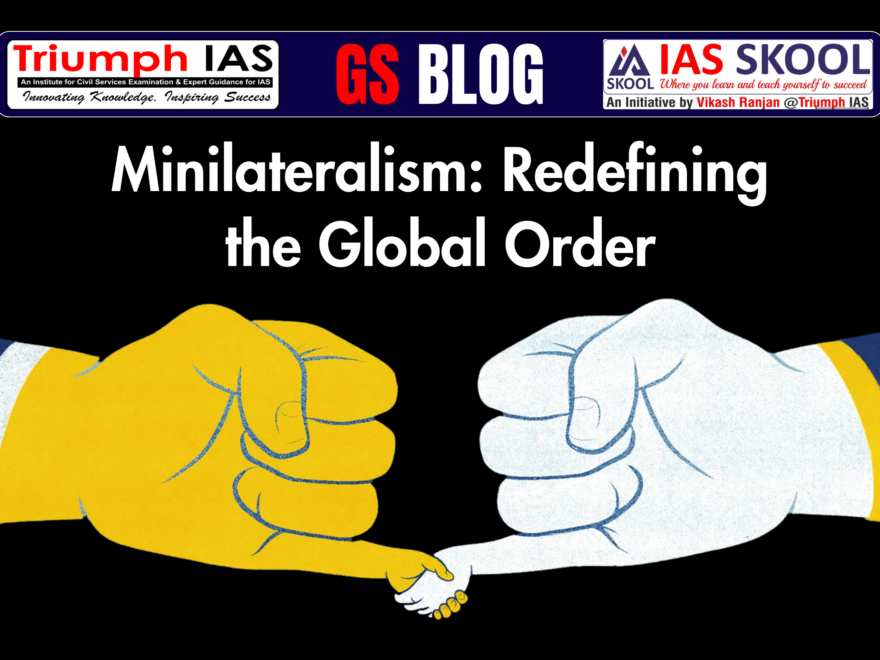Minilateralism: Redefining the Global Order
Minilateralism is transforming the global landscape by promoting targeted partnerships among nations to tackle specific regional challenges, marking a departure from the slower and often inefficient processes of multilateralism. India has emerged as a key player in this paradigm shift, utilizing mini lateral platforms to promote multipolarity and safeguard its strategic interests. Focused on fostering trusted alliances and ensuring secure trade, mini lateralism provides nations with a viable alternative to the unpredictability of global governance. However, while these frameworks deliver swift and specialized solutions, their limited scope may impede the resolution of broader global challenges.
Minilateralism
Minilateralism involves the establishment of smaller, issue-specific coalitions or alliances comprising a limited number of nations to tackle global, regional, or thematic challenges.
These partnerships are typically formed among countries with aligned interests, objectives, or concerns, enabling faster decision-making and more precise outcomes.
Example: The Quadrilateral Security Dialogue (Quad), which includes the U.S., India, Japan, and Australia, exemplifies minilateralism, focusing on promoting a free and open Indo-Pacific region.
Global Order Shifting Towards Minilateralism from Multilateralism
Fragmentation of Global Consensus
Multilateralism often faces challenges in achieving consensus due to the conflicting interests of its diverse member states, resulting in inefficiency and inaction.
For example, the World Trade Organization (WTO) has been unable to conclude the Doha Development Agenda even after two decades of negotiations.
In response, countries are gravitating toward smaller, issue-specific coalitions like the Comprehensive and Progressive Agreement for Trans-Pacific Partnership (CPTPP).
Power Asymmetry and Emerging Geopolitical Rivalries
The dominance of major powers within multilateral institutions often marginalizes smaller nations, leading to dissatisfaction and mistrust.
For instance, China’s Belt and Road Initiative (BRI) operates outside traditional frameworks like the World Bank, reshaping global finance.
Similarly, smaller coalitions such as the G7 have emerged to counterbalance this influence, as evidenced by recent G7 statements addressing China’s economic coercion.
Efficiency and Speed in Crisis Management
Minilateral frameworks allow for quicker responses to emergencies compared to multilateral setups, which are often hindered by bureaucratic delays.
For example, during the COVID-19 pandemic, multilateral bodies like the WHO were criticized for slow action, whereas Quad nations collectively pledged to distribute over 1.2 billion vaccine doses globally, demonstrating the agility of minilateral arrangements.
Focused and Tailored Approaches
Minilateralism enables countries to collaborate on specific, actionable goals without being constrained by broader multilateral obligations.
For example, the Australia-UK-US (AUKUS) alliance focuses on regional security and technology sharing in the Indo-Pacific, bypassing the inefficiencies of larger frameworks like the UN Security Council.
Response to Structural Shifts in Global Power
The emergence of regional powers like China and India has encouraged the creation of minilateral platforms to address regional priorities.
For instance, the Regional Comprehensive Economic Partnership (RCEP), which excludes the U.S., demonstrates how Asian economies are creating alternative frameworks to traditional multilateral systems dominated by Western powers.
Crisis of Legitimacy in Multilateral Institutions
The failure of institutions like the UN to effectively address major global challenges, such as the Russia-Ukraine war, has diminished their credibility.
This erosion of trust is further evident in the growing rejection of UN peacekeeping missions, such as Sudan’s termination of UNAMID, Mali’s forced withdrawal of MINUSMA, and the Democratic Republic of Congo’s push for MONUSCO’s exit.
Role of India in the Rise of Minilateralism
Leadership in Regional Security
India is emerging as a key player in minilateral security frameworks, aiming to counterbalance China’s growing influence in the Indo-Pacific region.
Through the Quad (comprising India, the USA, Japan, and Australia), India actively works on issues such as maritime security, combating illegal fishing, and ensuring freedom of navigation.
Additionally, India remains involved in SAARC (South Asian Association for Regional Cooperation), emphasizing regional stability, counterterrorism, and economic cooperation.
Economic Partnerships Through Targeted Agreements
India has taken a proactive role in forming minilateral trade and economic agreements to strengthen regional supply chains and reduce dependency on China.
For example, under the India-UAE Comprehensive Economic Partnership Agreement, both nations have committed to doubling trade in non-petroleum products to USD 100 billion by 2030.
Strategic Technology Collaborations
India is leveraging minilateral platforms to advance its technological and innovation capabilities.
For instance, under the Quad, India collaborates with the USA and Japan on semiconductor manufacturing.
Following an agreement with the US, India is setting up a multi-material semiconductor fabrication unit in Jewar, Uttar Pradesh, to boost its domestic tech ecosystem.
Climate Leadership through Specialized Coalitions
India is at the forefront of climate action initiatives through minilateral frameworks like the International Solar Alliance (ISA), which promotes solar energy solutions for developing countries.
During its G20 presidency, India launched the Global Biofuels Alliance, a significant step toward sustainable energy transition, showcasing its leadership in climate-focused minilateral efforts.
Building South-South Cooperation
India is championing minilateral South-South cooperation to address development challenges in the Global South.
The India-Brazil-South Africa (IBSA) Dialogue Forum focuses on poverty alleviation, trade, and sustainable development.
In 2023, India hosted the Voice of the Global South Summit, uniting countries to discuss global inequalities and advocate for reforms in multilateral institutions.
Advancing Supply Chain Resilience
India is playing a pivotal role in minilateral efforts to enhance global supply chain resilience and diversification.
Through the India-Australia-Japan Supply Chain Resilience Initiative (SCRI), India is contributing to building diversified and resilient global supply chains, positioning itself as a major beneficiary.

Challenges India Faces in Navigating Minilateralism
Balancing Strategic Autonomy with Partnerships
India’s historical commitment to non-alignment poses challenges in aligning more deeply with minilateral frameworks.
For instance, India’s participation in the Quad raises concerns about compromising its strategic autonomy, particularly as it balances relationships with Russia, a long-standing defense partner.
In 2023, India procured 36% of its defense equipment from Russia, even while participating in Quad maritime exercises with the U.S.
This dual strategy complicates India’s ability to fully commit to any singular minilateral agenda.
Managing Diverging Interests Among Partners
Minilateral frameworks often bring together nations with conflicting priorities, making consensus-building a challenge for India.
In the Quad, the U.S.’s strong anti-China stance contrasts with India’s cautious approach, as China remains its largest trading partner in 2023-24.
Such differences can hinder cohesive decision-making and strain India’s leadership role within these alliances.
Uneven Focus on Key Issues
Minilateral platforms tend to focus narrowly on specific goals, often sidelining broader issues important to India.
For example, while the Quad emphasizes Indo-Pacific security, it offers limited collaboration on critical areas like climate change or WTO reforms.
India estimates it will require around $2.5 trillion for climate-related initiatives by 2030, highlighting its need for diversified international partnerships beyond security concerns.
Resource and Capacity Constraints
India faces limitations in institutional capacity and financial resources, which restrict its ability to actively engage in multiple minilateral forums.
For instance, balancing roles in the International Solar Alliance, the Quad, and BRICS simultaneously requires significant diplomatic and financial bandwidth.
With a defense budget of $72.6 billion in 2023 already stretched, India has limited scope for additional commitments.
Risk of Marginalization in Global Institutions
Overemphasis on mini lateralism risks sidelining India in traditional multilateral platforms where larger reforms are necessary.
For example, India’s push for UN Security Council reforms has seen little progress, despite its active role in minilateral forums.
A disproportionate focus on smaller alliances might undermine India’s long-term aspirations for global institutional reforms.
Lack of Cohesive Domestic Consensus
India faces domestic challenges in aligning national interests with its international commitments in minilateral frameworks.
For instance, debates around the Regional Comprehensive Economic Partnership (RCEP) highlighted fears about adverse impacts on domestic industries, leading to India’s withdrawal in 2020.
This underscores internal opposition to deeper commitments in such alliances.
Overlapping Frameworks and Duplication
The growing number of minilateral platforms risks redundancy and inefficiency.
For example, India is a member of both the Quad and I2U2, which overlap in areas like technology and infrastructure cooperation.
Managing coherence among these platforms is challenging, especially when member nations prioritize different agendas within each grouping.
Measures India Can Adopt to Balance Minilateralism with Multilateralism
Champion Reforms in Multilateral Institutions
India can actively advocate for reforms in global institutions like the UN, WTO, and IMF to make them more inclusive and effective.
It should prioritize UN Security Council reforms, leveraging its growing global stature and alliances with the Global South.
Collaborating with countries such as Brazil and South Africa in forums like IBSA can help India build momentum for these reforms.
Strengthen Regional Multilateral Frameworks
India should focus on revitalizing regional organizations like SAARC and BIMSTEC while utilizing minilateral platforms to address specific challenges.
For instance, India can propose linking the Quad’s maritime security initiatives with BIMSTEC’s blue economy projects to foster broader regional cooperation.
Develop a “Hybrid Diplomacy” Model
India can adopt a structured hybrid approach where minilateral frameworks complement multilateral institutions, ensuring synergy between the two.
For example, India could expand the International Solar Alliance (ISA) by including more Global South countries while using smaller coalitions like the Quad to accelerate technology transfers.
Establish Leadership in Global South Coalitions
India should focus on leading Global South initiatives in multilateral forums while addressing targeted issues through minilateral platforms.
Building on its 2023 G20 presidency, India could institutionalize the Voice of the Global South Summit as an annual multilateral platform.
Representing over 60% of the world’s population, India can act as a bridge between smaller coalitions and larger multilateral bodies.
Align Minilateral Agendas with Multilateral Goals
India can synchronize its minilateral efforts with broader multilateral objectives like the UN’s Sustainable Development Goals (SDGs).
For instance, India could integrate the Quad’s technology-sharing initiatives with UNDP programs to support SDG 9 (Industry, Innovation, and Infrastructure).
India’s renewable energy targets of 500 GW capacity by 2030 can also align with ISA’s global solar energy goals.
Leverage Economic Diplomacy for Multilateral Impact
India can use its minilateral economic partnerships to influence global trade policies in multilateral forums.
For example, the India-UAE-Israel trilateral trade initiatives could be integrated with larger trade blocs like the African Continental Free Trade Area (AfCFTA), which includes 54 countries, amplifying India’s economic influence.
Minilateralism is transforming global governance by providing flexible and focused solutions to regional challenges through specialized partnerships. India’s proactive role in this shift, especially in initiatives like the Quad, strengthens its global influence while safeguarding its strategic interests.
However, the narrow focus of these coalitions limits their ability to address wider global challenges. To maintain equilibrium, India should advocate for reforms in multilateral institutions, adopt a hybrid diplomacy approach, and align minilateral objectives with broader global priorities. This strategy will ensure the coexistence and success of both regional and global cooperation.
The End of the Blog: Minilateralism: Redefining the Global Order

|



















2 comments